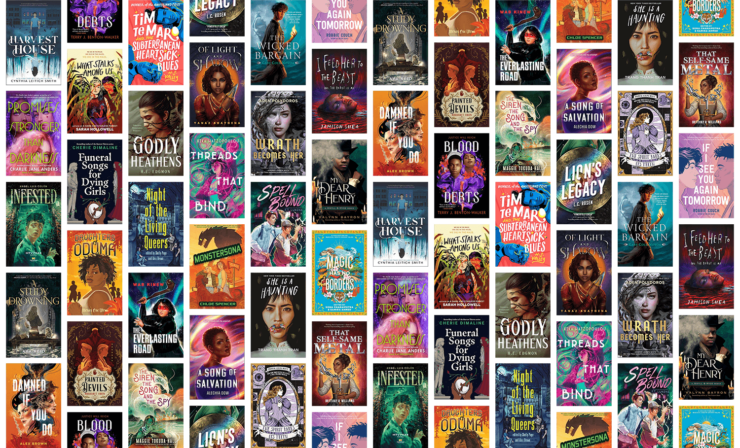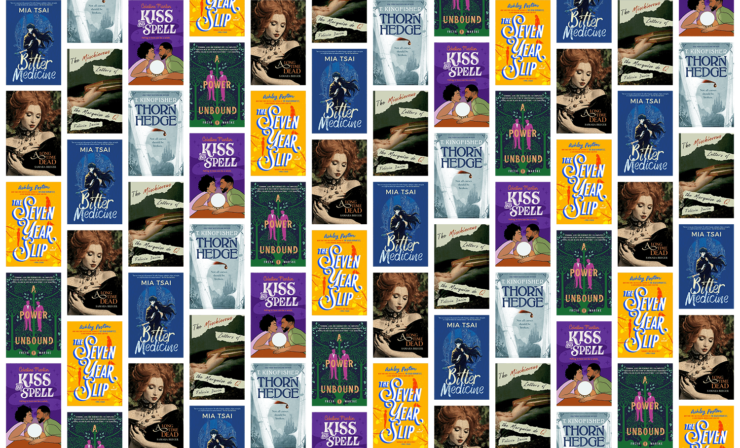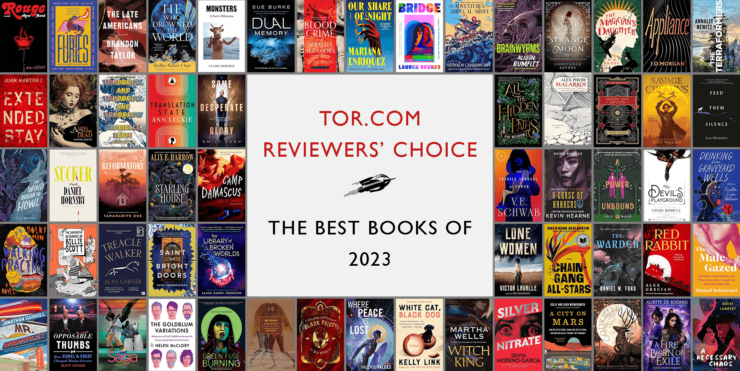Happy New Year, and welcome to Tor.com’s yearly round-up of some of our favorite articles from the twelve months! In case you missed it, there’s a separate list for discussions about fiction, reading, writing, and all things book-related; the list below highlights essays about other aspects of popular culture, with a focus on film, television, and gaming in particular.
We’ve focused on standalone essays and articles, here, but we’re also quite proud of all the television reviews and movie coverage we’ve published in 2023—a year indelibly marked by the WGA and SAG-AFTRA strikes, which brought new focus to a number of issues affecting the actors, writers, and other artists and professionals whose creativity and labor are indispensable within the entertainment industry. Without them, we wouldn’t have all these amazing shows or movies to talk about, and what would we do without bickering angels and demons, fabulous pirates, adorable dragons, Starfleet, and Barbenheimer?
We hope that you enjoy the selections below, and please feel free to tell us about the articles and columns (and movies and shows) that struck a chord with you over the last year…
Genres on the Rise: Competence Porn and Cozy Fantasy
Competence Porn Is Comforting — Where Can I Find More of It? by Rachel Ayers
There’s something so very gratifying about watching people live up to their full potential—getting to see all the hard work they put in pay off, not just in their private satisfaction but as part of a group of similarly talented, driven people who have dedicated themselves to their craft, and a shared goal. It’s not unusual to dream about being outstandingly good at something, and in the end there’s a level of pure enjoyment that comes from seeing someone doing something they love, perform flawlessly, and win the day.
Sixties Fantasy Sitcoms and the Rise of Cozy Fantasy by R. Nassor
Cozy fantasy books make room for magic homemaking in regular, everyday life in a way not many works of fiction tend to do. Cozy, much like horror or comedy, is an emotional genre. The books are written to evoke warmth and comfort, and while the process can be subjective and responses might from person to person and over time, certain key elements tend to remain the same. We can see some of the DNA of the ’60s fantasy sitcom mirrored in this new wave of cozy fantasy because we still respond to those elements—the comforts of home, family, friendship, and security, with just enough magic to keep things interesting and add a bit of comforting escapism into the mix.
Movie Moments from 2023
To Every Other Jobu Tupaki After Jamie Lee Curtis’s Oscar Win by Maya Gittelman
It’s funny, isn’t it? This is a story about a wild, wonderful multiverse of possibilities, and we still live in the universe where a story gets made out of our specific trauma and that story swept the Oscars, winning seven out of eleven nominations—including Best Supporting Actress—but not for the queer girl at the everything bagel core of the story whose heartache broke the world.
How a Chonky Dragon Wyrmed His Way Into Our Hearts by Leah Schnelbach
I think part of it is how he works with his shape. Rather than trying to fly, he chugs along like an earthworm. Rather than rearing up on his hind legs to impress them with his size, he rolls toward them, reveling in the way his weight carries him. He just seems so happy and excited to have something to hunt. And don’t get me wrong, I love the party in Dungeons & Dragons: Honor Among Thieves, but I have to admit I was rooting for Themberchaud a little bit.
I Said I’d Make a Woman: Barbie and the Pygmalion Paradigm by Kristen Patterson
[T]hough Barbie’s success may feel unprecedented in our current cultural moment, the story of Barbie herself that Gerwig chooses to tell—that of a doll’s decision to become a real woman—actually has thousands of years of precedent in a story model that pervades multiple genres of film and literature, though is especially at home in tales of magical realism and science fiction: the myth of Pygmalion and Galatea.
Perspectives on Horror in Film and TV
“Not Much Choice”: Disability and Monstrosity in the Alien Franchise by Jay Kang Romanus
Disabled people don’t choose our disabilities; we’re instead thrown into an unhelpful world and told to survive. We’re taught to hate our own existence by the kind of bigotry represented by Chicago’s law, which described us as “disgusting object[s]” and condemned us for the crime of stepping outside. By the time of 1997’s Alien Resurrection—the fourth and final movie featuring Ellen Ripley—her journey of self-acceptance mirrors the journey disabled people must take in order to learn to live with ourselves in a world like this.
The Horror of Powerlessness: Skinamarink and the Rapture by Sarah Welch-Larson
Skinamarink is slow cinema masquerading as found-footage horror. The film’s inciting incident is of two children waking up to find that their father—and all the exterior windows and doors to their house—are gone. They’re left to fend for themselves in a home that has turned hostile, trapped in the dark with no way in or out, with only a TV and toys for company. Like most slow cinema, the film consists of long, quiet takes in which not much happens on screen; the genre invites contemplation and reflection. There isn’t much plot beyond the premise. The most common reading of the film is that it’s about child abuse, heavy fare for a difficult movie—but my own experience with Skinamarink had to do with another sense of powerlessness: that of childhood fear of the Rapture.
Science, Fiction, and Fungi: What The Last of Us Gets Right by Corrado Nai
Stories like The Last of Us do not transport us to a distant future or to an unrelatable, unrealistic scenario: they catapult us into the midst of a present we do not take seriously enough. The Last of Us hits us like a punch in the face, warning us to pay attention while we can. We need those stories. For many vulnerable people, better funding and research, a better understanding of the realities of fungal pathogens would mean a safer and healthier future. When it comes to fungi, all of us should care.
Spotlight on Superheroes
How Miles Morales Reclaimed His Own Story in Spider-Man: Across the Spider-Verse by Monita Mohan
The creators of Spider-Man: Across the Spider-Verse played upon our fears of their lead character of colour disappearing from the story, and turned that fear into the central plotline. Miles is desperate to belong in the Spider Society, and the spectacle of hundreds of Spider-People feeds into that desire. Miles has been the one and only Spider-Man of his world for a year— wanting to belong to something and be with people like him is understandable. He could easily have been lost in the crowd, the sole Miles Morales in a sea of Peter Parkers (with some exceptions). We live in a world where people of colour are still expected to diminish themselves to fit in, to toe the company line and maintain the status quo. To watch Miles defiantly refuse to follow the herd, even if that meant not being welcome among people he so desperately wanted to be with, is a statement in itself.
Eugenics and the Human/Animal Divide in Guardians of the Galaxy Vol. 3 by Leigha McReynolds
The Guardians defeat the High Evolutionary by refusing to reinscribe the hierarchies that he creates and sustains: by refusing the eugenic logic that some lives are better and some lives are not worth living. As audience members, our ability to recognize that what the High Evolutionary does is wrong makes us feel good about ourselves. We, too, are the good guys. But in reality, uncritical acceptance of eugenic systems and new eugenic practices align us with him, not the Guardians. We may be watching “just” a superhero movie, but our awareness of the history of eugenics and the dark side of genetic technology is part of the High Evolutionary’s defeat.
Martin Scorsese, Paul Schrader, and Terrence Malick Meet at a Diner to Discuss Ant-Man and The Wasp: Quantumania by Leah Schnelbach
Our scene opens in a New York Diner—the kind that would have been bustling at 3:00am only a few years ago, but in our rent-hiked, COVID-ravaged city only a few people are sitting. They’re engaged in a heated discussion—or at any rate, two of them are, while a third seems to shrink into a corner of their shared booth…
Deep Dives Into Star Trek
Why Did Star Trek: Picard’s Final Season Focus on the Wrong Family? by Emmet Asher-Perrin
The final season of Picard was so touching. Wasn’t it great seeing all our friends back together again? Wasn’t it moving to learn how they’ve changed? Cathartic to let them all band together to save the galaxy one more time? Who wouldn’t want to be at that poker table, huh?
Now that I’ve gotten that out of the way—we need to talk about Beverly Crusher.
“A Critical Division of Starfleet Intelligence”: Section 31 and the Normalization of the Security State by Jaime Babb
The revelations presented are truly heinous—even difficult to watch—and the entire season-long arc largely results from blowback against Section 31’s crimes against sentient life. And yet… the story pairs these revelations not only with complete legitimation of 31 as an organization, but complete acceptance of its crimes on the parts of our ostensible heroes. Worf—you know, the honourable guy? Whose friend, Odo, was deliberately infected with a plague by Section 31 with the intent of using him to wipe out his entire race? That Worf?—even calls them a “critical division of Starfleet Intelligence.”
Ben Sisko’s Non-Linear, Non-Binary Arc in Deep Space Nine’s “Emissary” Saved All My Lives by Jonathan Alexandratos
It betrays the pitch-after-pitch, experimental game of baseball Sisko thought he was living. It betrays linearity. The answer isn’t to ball all this up and throw it away, though. It’s to simply be. To exist. To know that existence is not just non-linear but non-binary. Sisko, like all humans, contains the capacity to exist across many pasts, choices, and futures. All of those existences can inform one another. We exist in dark recesses and hopeful speculations, and you are, like any good Motel 6, leaving a light on for you. It is upon this realization that the “Emissary” script notes the parenthetical: “And [Sisko] finally starts to grieve properly.”
Gaming Is Life
I Am a Mature and Responsible Adult Who Will Attach Rockets to Anything Just to See What Happens by Kali Wallace
Playing video games is not revolutionary praxis. But creating space for pleasure in a world that demands nonstop productivity in service of distant and often unachievable goals is.
I’m talking about fun. It’s good to have fun. Fun without a purpose. Fun that does not contribute in any material way to your economic status or career progress. Fun that does not serve any boss except itself, does not need or ask to justify its existence on any moral or practical axis, does not exist only as a stepping stone to a specific achievement.
The Very Small and The Very Large: Outer Wilds as Interactive Space Opera by Melissa Kagen
Videogames are great at being enormous and intense, and they’re great at being intimate and cozy. When we are very lucky, we find a game like Outer Wilds, which is both at once. This is also what excellent space opera tends to be—asking huge questions, but couching them in tiny, human-to-human connections. Philosophically vast, but snarky and personal. Intimate community plus vast, empty space.
How Baldur’s Gate 3 and Honor Among Thieves Finally Captured the Soul of D&D by Tyler Dean
Past attempts at adapting D&D have come across as lackluster, generic, or subpar fantasy fare that failed to realize that the game didn’t draw in generations of player because of its lore…it did so because it gave its players a deep sense of belonging. Honor Among Thieves, if you strip away its (admittedly very funny) one-liners and affable silliness, is a heartfelt story about the power of found family. Baldur’s Gate 3 is a video game that encourages its players to question whether or not they are being led into a gilded cage, unable to trust their own desires, and either struggling, heroically, to resist temptation, or else giving into it with relish and a touch of morbid curiosity.
Close Reads
Finally, let’s all take a minute to appreciate another year spent with the awesomely eclectic Close Reads column, curated by Leah Schnelbach. Digging into “the tiny, weird moments of pop culture,” Leah and their guests have explored the life-affirming joys of Pushing Daisies, the modern murder mysteries of Rian Johnson, and watching the Wachowski sisters’ Speed Racer for the first time. Trek fans can revel in the wonders of Worf’s character arc and Odo’s cooking, and others can wax nostalgic over Jumanji’s amazing Aunt Nora and the Book It! reading program—you can check out the full series here!
***
There’s so much to talk about, so let’s continue this in the comments—let us know what you think! And as always, if you’re feeling nostalgic or just looking for more deep dives into pop culture, you can always check out our “Some of the Best…” articles from previous years: here’s last year’s Film, TV, and Pop Culture list, last year’s list of Fiction articles, and our round-ups from 2021, 2020, 2019, 2018, and 2017. Thanks for reading!














